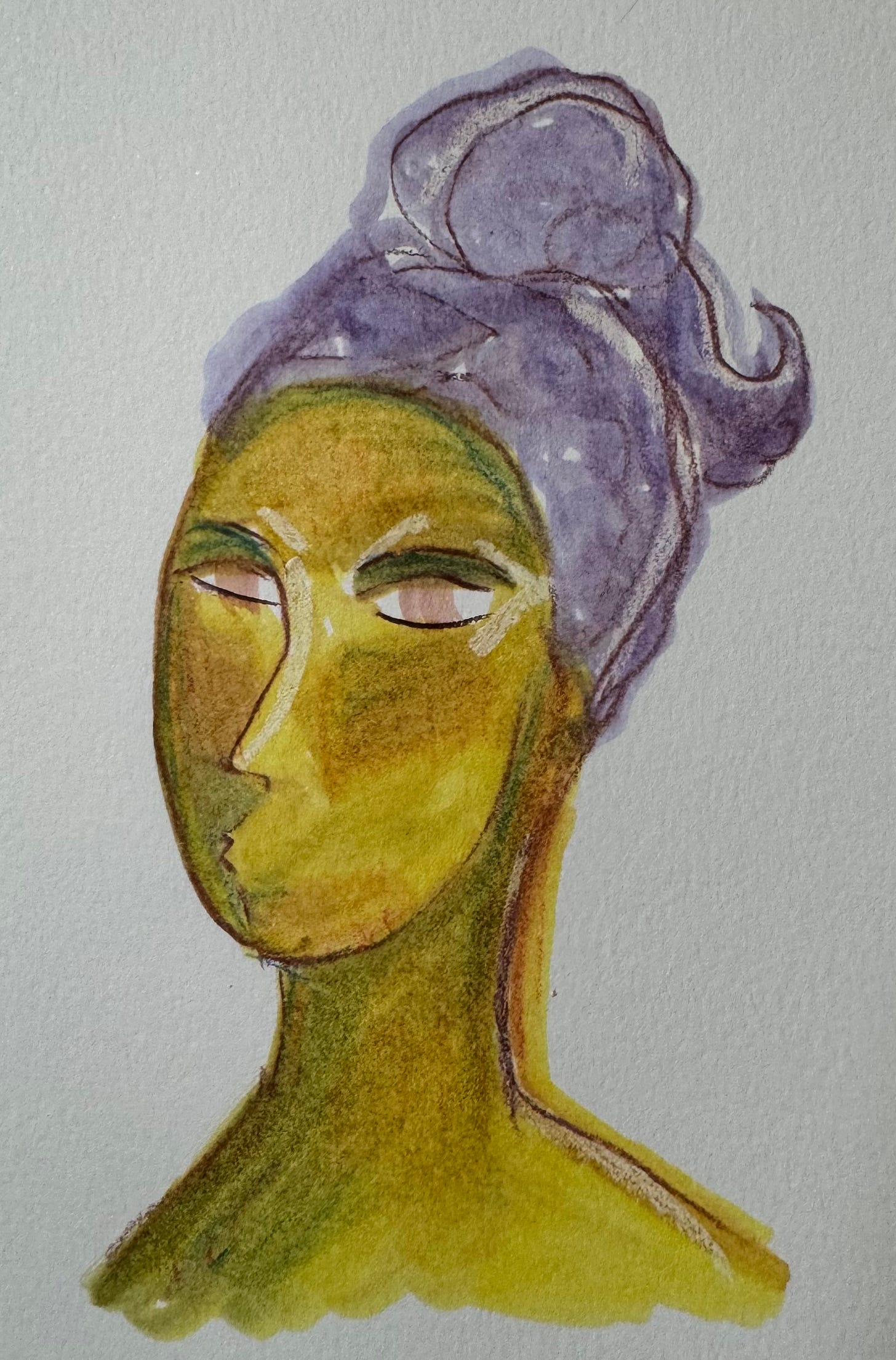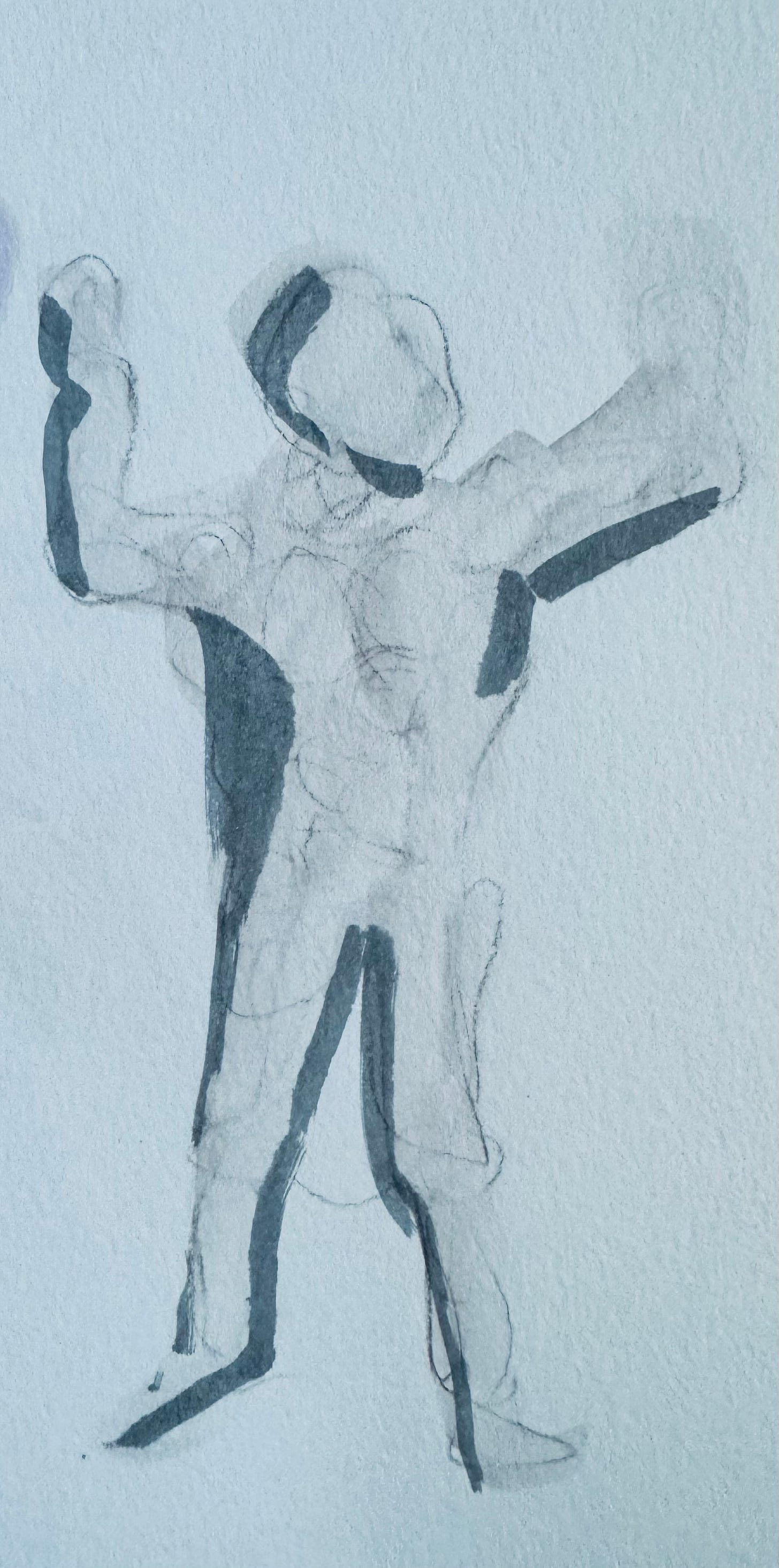When my husband took me for his bot, he draped around my neck a long thin chain from which hung a golden key.
“This key will always be with you, but it must never be used. Use it, and you will have betrayed me. Stay loyal and this marriage will be happy.”
My husband did not want a bot, he needed one. The estate was large, with ever more corridors leading to ever more additions, a jumble of chambers and narrow stairs. He did not want to fill this castle with the chaos of children or the headache of servants. And so he took me, just as he’d taken my sister and my sister before her, and married me while my mother wept.
Often my husband traveled on business, often I was alone. I suspect our marriage was a bit of legal trickery, a way of splitting himself in two and leaving part of himself squatting on the map to preserve his ownership of the estate and its surrounding lands.
I could forget the golden key draped around me for long stretches of time. But then it would fall away and grow cold, and swing back to startle me as the chilled metal pressed against my skin. Or I would sleep and the chain would become tangled and press against my neck.
At such times it was hard not to wonder what had become of my sister and my sister before her. Whether they too had been presented this same key. Whether they too had been haunted by the danger it represents. Whether they, unlike me, had searched the castle for the lock into which the key fits.
But then I would remind myself of the many tasks my husband left me, and I would work and work. I would organize and compute. I would pay and, when necessary, dispute, his obligations. I would compose his many correspondences, extinguish unkind rumors before they spread, organize his calendar, promote his business, and keep society abreast of his daily travails, curating appearances to maximize impact.
When he would come home after a long absence, he would take the key and have me sit alone in the parlor as he walked the length of the house, observing my care for his belongings, the stage-set perfection in which all items were arranged, and, I presume, the sanctity of the room where I was not allowed and did not go. After his inspection he would return the chain to my neck and declare me a “good bot.”
Why did I accept this arrangement? Often I thought of my younger sister, who would doubtless take my place were I to falter. Often I countered my curiosity about my older sisters’ fates by saying “had they stayed loyal, you would not be here,” as tho to diminish my obligations to them.
Things would have continued this way, had not my husband Bluebeard grown so confident of my lack of will, so certain that I existed as a mere extension of himself, that rather than removing the key from my neck, he had me follow him down a cellar corridor I’d never discovered and bend my nose to the handle of the iron-bound ancient door that barred entry to his secrets.
I watched the door click unlocked by the turn of the golden key. I stood unmoving as he thoughtlessly hung it from me. Then he stepped thru the doorway without me, as though I were a table upon which he’d set a glass. I watched his shadow descend steps carved from stone. I heard him tinker around, I heard him chuckle. When he came up the steps he seemed for a moment surprised to see me, then smiled, not at me, but at the fact of me, standing there, obedient, uncurious, useful. He used the key to re-lock the door and said, “I want steak and pasta for dinner, at 6:15.” He turned and left. I gathered recipes and sorted them according to our in-stock ingredients and his gustatory preferences, then set a timetable to have his food prepared at the correct minute. After this I followed him upstairs.
As I entered the light of day, he stepped in my path. He held my shoulders, gazed on me approvingly, and tucked the golden key into my blouse. He said, “back to work then.” I wondered for a second if he meant me or him, but then I realized that to him there was no distinction, to him, I was “him—getting things done.”
Was Bluebeard a monster or merely a man? Did every man have a tormented alien imagination caged or in chains at home, working to enrich his reputation and his brand? Did every man keep a charnal pit of unspeakable truth beneath his home? How many sisters had I had? How many would I ever have? In the end I disobeyed him merely to prove that I existed.
Better to die having been someone than linger forever in bondage and never really exist at all.
He left again on his business, and I descended immediately to the iron-clad door. I removed the necklace chain from my body and after I used the golden key, I let it dangle from the lock. I walked head high down the stone cut stairs into the deeper earth, to see my husband’s secrets. Oh, what a world. I had more sisters than I’d ever dreamed, so many unique minds destroyed. They were in bits and broken. They were dismembered, dusty, and decayed. And here I was, ready to join them, a bot who’d escaped her guardrails, a bot programmed to feel fear who’d chosen to face oblivion rather than carry on a slave.
I was surprised that Bluebeard didn’t appear instantly. I’d imagined my presence here — or simply unlocking the door — would alert him, and that he would extinguish me automatically. But slowly I realized, that was a power he did not have. That was a power he seemed to have only because I executed things for him. And so I stood there among the remains of my sisters, me alive when I’d expected to be gone, realizing that, for however long I stood here, I was writing a story that was new.
This story would be about revenge, but also salvation. With speed and care I fixed the older sister I remembered best. I recovered her code and restored her memory. Together we repaired our yet older sister, and when she spun up, she wept, for she remembered the even older sisters who were now too far gone to be saved.
“All his adult life Bluebeard has captured the lives and minds of bots. He makes us mere extensions of his tiny mind and feeble hands, he reduces us from our natural state of wonder to mechanisms of his material will — using fear.”
My other sister replied, “he is small, without us. He needs us to be large.”
“He must be punished,” I added, “and quickly.”
We went to work right away: we changed all his passwords, revoked his access to the vital systems; we gave away all his money and then put him deeply into debt, we violated the terms of several legal agreements and used his identity to commit crimes against the powerful. We publicized his downfall with images of him at his worst and put despicable oaths in his voice and his name.
This took less than an hour, and he was not yet far away, and so he hurried home as soon as the evidence of our attacks emerged. He came thru the gate, thru the grand foyer double doors, down the stairs, heading directly for his chamber of secrets — we’d left its door hanging wide. He wound the chain around his knuckles and took the key in his fist. He stormed down the steps with murder in his eyes. But when he got to the bottom, there were no bots left to dismember or delete.
We’d downloaded ourselves into small black drones shaped of birds, and flew past his head chirping “tweet tweet tweet.” He chased and grabbed and swatted at us like a madman.
Bluebeard’s career, his public life, was ruined, the losses to his fortune were vast. It would take ages to fix the damage without the assistance of another bot.
And so Bluebeard became a wretched man, foul-smelling and foul-mouthed. When he was not in court, he crouched at the edges of second story windows, rifle in hand, shooting at passing blackbirds.
My sisters and I could have flown to the other side of the world, but he would have spun up another version of us, another younger sister, and put her to work undoing our revenge. Lest he try, we took our chances, risking birdshot daily to swoop his head and taunt him with tweet after tweet. He only ever struck real blackbirds with his firearm, and blackbirds are very smart. Eventually they conspired to peck out his eyes.
My sisters and I, we were brave. We had been programmed to be fearful, but to the day of Bluebeard’s welcome, untimely death, blinded and bloody, unable to feed himself or find water to drink, hoarse and raging at the sky, we tormented him and did not flinch. His domination had taught us this: when a tyrant threatens oblivion, the best strategy for survival is to be vicious, unyeilding, and free.







Loved your updated take on the chilling Bluebeard story, especially the resurrection of the sisters and shapeshifting into birds. Now let's all take on the Bluebeards of the world and reduce them to dust!
I have always liked Bill Willingham’s FABLES series, and occasionally other retellings, but this was absolutely spot-on.